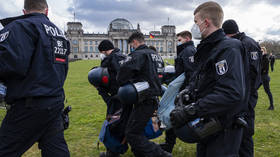Germany letting its spies target lockdown opponents is another alarming example of a ‘democracy’ using Covid to stifle dissent

The global pandemic has facilitated highly undemocratic policing across the West. Now, just as scientific support for lockdowns is beginning to wane, Berlin has classified anyone opposed to the policy as an enemy of the state.
On April 28, German domestic spying agency Bundesamt für Verfassungsschutz (BfV – Federal Office for the Protection of the Constitution) announced that it intends to place the country’s ever-growing anti-lockdown movement under surveillance.
Of particular concern is the so-called Querdenker (‘lateral thinking’) group, a key participant in large-scale protests that have routinely erupted across Germany over the course of the pandemic, on the basis it questions the legitimacy of the state.
As a result, the BfV has created a new, dedicated monitoring category –“delegitimization of the state where relevant to constitutional protection”– on the basis lockdown opposition does not fall under pre-existing concerns, including far-right, far-left, or Islamist.
The move makes it possible to process criminal cases both as suspected crimes and proven extremist endeavors, effectively making illegal all public anti-lockdown agitation in Germany, and meaning anyone arrested for engaging in such activity could be in serious trouble.
Untold numbers of people have been apprehended at protests over the past year, often for breaching lockdown restrictions, despite Germany’s Constitutional Court ruling in April 2020 that these measures did not allow for bans on rallies.
A week prior to the BfV’s announcement, 2,200 police were deployed to break up a mass protest in Berlin against tough new lockdown measures, scheduled to endure until June if not later. These include a curfew, limits on the number of customers allowed in stores at one time, the closure of bars, restaurants and gyms, restrictions on household contact, and more. More than 150 were arrested.
The new monitoring category in effect creates an equivalence between opposition to lockdown measures, and unconstitutional, subversive activities. This is a highly disturbing development, given that while protests in Germany have no doubt attracted their fair share of deranged conspiracy theorists and ‘anti-vaxxers’ who may pose a threat to public safety, average citizens reasonably frustrated at the ravaging psychological, emotional, financial, and social impact of lockdown have also regularly been in attendance in the thousands.
This plurality is amply underlined by the harsher new measures being opposed in parliament by the left-wing Linke, liberal Free Democrats, and far-right Alternative für Deutschland. A survey conducted in March found 43% of Germans thought restrictions should be relaxed, while 17% were in favor of a complete return to normality. Disapproval of Chancellor Angela Merkel’s handling of the pandemic has seen public support for her ruling coalition collapse, with some polls placing the upstart Greens neck and neck if not ahead of the CDU.
Lockdown skepticism isn’t fringe in the scientific community either. In March, the Center for Economic Policy Research – a leading disseminator of academic work on the coronavirus – published analysis of data from 152 countries over the course of 2020. It found that while initially worthwhile, lockdowns “[do] not work as a continuous containment policy in the event of a protracted pandemic.” Germany is a palpable example of this ever-declining efficacy, given that despite being largely bunkered ever since late October, cases and deaths have continued to climb untrammelled.
Under the BfV’s new monitoring category, would the academics who produced the paper, the organization that promoted it, and anyone who shared it online, be considered to have “delegitimized the state,” engaged in a “proven extremist endeavor,” and as a result justifiably made subject to intensive surveillance or arrest for purposes of “constitutional protection”? What about rights groups that have cautioned against the introduction of vaccine passports? Or NGOs that have drawn attention to the unlawful enforcement of lockdown restrictions?
Germany is far from the only supposedly democratic nation that has greatly increased its surveillance and policing powers to crack down on dissent over the course of the pandemic. In the UK, it’s been confirmed police have employed blanket spying powers created to fight organized crime and terrorism to investigate potential breaches of Covid regulations. It’s unknown how many individuals may have ended up in court as a result, but it was revealed in February that all 246 prosecutions under Whitehall’s Coronavirus Act – introduced in March the previous year – had been wrongful.
Also on rt.com Ineffective & disproportionate? Germany’s new lockdown law sparks flurry of Constitutional Court complaints, including by MPsThat figure is likely much higher now. While some of those arrested for non-existent breaches of the Act may have been anti-lockdown protesters, most were simply people going about their business. Coronavirus powers also provided a pretext for the violent arrest of several people engaged in an entirely peaceful, legal, socially-distanced candlelit vigil in London commemorating Sarah Everard, who was kidnapped and killed in March. That hideous crime led scores of women to publicly share their experiences of harassment during the pandemic – clearly, lockdown has made the streets an even less safe space for them.
There are indications the online realm is to be made a more hostile environment for dissenters too. In November 2020, Metropolitan Police counter-terrorism chief Neil Basu called for a “debate” on the introduction of laws to punish people spreading “misinformation” related to coronavirus “that could cost people’s lives.” Should legislation result, it’s almost inevitable official definitions of “misinformation” will be sweeping, given his unit once categorized well-meaning grandmothers opposed to fracking as “domestic extremists.”
It’s likewise almost inevitable that some pandemic restrictions will be maintained in the UK. For one, Prime Minister Boris Johnson – entirely falsely, if the aforementioned academics’ findings are accurate – contended earlier this month that lockdowns, not vaccines, are the driving force behind the country’s much-reduced casualties and caseload, and “the majority of scientific opinion” remains “firmly” of the view “there will be another wave of Covid at some stage this year.”
More importantly though, when governments acquire greater power, they don’t give it up easily, or without a fight – and as lockdown has brutally and comprehensively eroded the ability of citizens to fight, greatly curtailing if not criminalizing so many common methods of opposition, holding on to all that has been illegitimately acquired becomes all the easier.
Think your friends would be interested? Share this story!
The statements, views and opinions expressed in this column are solely those of the author and do not necessarily represent those of RT.














